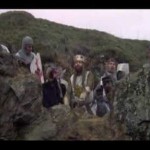We run our website the way we wished the whole internet worked: we provide high quality original content with no ads. We are funded solely by your direct support. Please consider supporting this project.

A Very Brief History of Open Theism
While the open view of the future has always been a very minor perspective, it has had its defenders throughout Church history and it has never been called “heresy” (until in mid 1990s when some started using this label).
According to some African American church leaders, it has been the predominant view in the African American Christian tradition (e.g., in The Color of God: The Concept of God in Afro-American Thought [Mercer Press, 1987]. Major Jones argues that the African Christian experience of oppression has enabled them to seize a dimension of the biblical portrait of God which the classical western tradition missed because of its overemphasis on control and its indebtedness to platonic philosophy).
More research needs to be done on the history of the open view, but my own research thus far has found advocates as far back as the fourth century (e.g., Calcidius). What’s most interesting about Calcidius is that his view is espoused in his Commentary on Plato’s Timaeus, which was used extensively throughout the middle ages. Yet, so far as I’ve been able to discern, no middle scholar thought his view was heretical enough to comment on.
In the early eighteenth century, a man named Samuel Fancourt published an essay entitled Concerning Liberty Grace and Prescience which led to a good deal of discussion about the topic in England. His arguments largely parallel those used by Openness advocates today. Also, it appears that Andrew Ramsay, a contemporary of John Wesley, espoused the teaching that God doesn’t know the future strictly as a domain of settled facts.
The topic was much discussed in the nineteenth century, being advocated by the renowned Bible commentator Adam Clarke, the popular Methodist circuit preacher Billy Hubbard, and some within the Stone-Campbell Restoration movement such T.W. Brents, whose 1874 book The Gospel Plan of Salvation puts the Open View of the future on center stage. This book was widely used as a theology textbook in the Stone-Campbell movement. On top of this, the Methodist professor and chancellor of Ohio Weslyean University, L. D. McCabe, wrote several books espousing Open Theism on biblical as well as philosophical grounds.
At the turn of the century, the view was espoused by Finnis Dennings Dake, author of the famous and influential Dakes Annotated Bible. The view had occasional defenders throughout the twentieth century and became a standard teaching among the early founders of Youth With a Mission.
This is brief (very brief) history only hits the highlights. But it demonstrates that the open view of the future has been a part of historic orthodoxy. The modern expression, propelled in an accessible form through the publication of The Openness of God by Clark Pinnock and others, falls in line with Protestant thought of theological reform. The entire Protestant movement has been rooted in the conviction that the church always needs more reforming, and whether particular theological claims contribute to this on-going reformation or not needs to be tested against Scripture.
Category: General
Tags: History, Open Theism, Theology
Topics: Defending the Open View
Related Reading

Lighten Up: Underestimated
Frank Viola is at it again. He seems pretty confident that when he and I debate the Open Future this fall that he’ll smear me. That’s his prediction, anyway. The think is, I’ve been underestimated before. It happens all the time. People think I’m this goof who doesn’t know what he’s talking about. That’s OK…

If God anticipates each possibility perfectly, how does he differ from the “frozen God” of classical theism?
Question: If God anticipates each and every possibility as if each were only possibility, how does God ever experience novelty and adventure? It seems that a God who perfectly anticipated (from all eternity) every single possibility as if it were the only possibility would not differ from the timeless “frozen God” of classical theism Answer:…

Greg on the Open View: Video One
By popular demand, we’re sharing the first of Greg’s video presentations on the Open View of the future. If you enjoy it, you can find the rest of the series entitled A Flexible Sovereignty: A Biblical Understanding of Providence and the Nature of the Future by clicking here. This video was recorded in 2008 at Azuza…

What is the significance of 2 Chronicles 32:31?
“God left [Hezekiah] to himself, in order to test him and to know all that was in his heart.” God tests his covenant partners to discover whether they will choose to remain faithful to him, an exercise that is absurd if God exhaustively foreknows exactly how faithful every person will choose to be. If the…

What is the significance of Judges 2:20–3:5?
The Lord did not provide any assistance in Israel’s battles, “In order to test Israel, whether or not they would take care to walk in the way of the Lord as their ancestors did” (vs. 22). The pagan opponents of Israel “were for the testing of Israel, to know whether Israel would obey the commandments…

What is the significance of Genesis 6:5–6?
Seeing the wickedness of the whole human race which preceded the great flood, the Bible says, “The Lord was sorry that he made humankind on the earth, and it grieved him to his heart.” If everything about world history was exhaustively settled and known by God as such before he created the world, God had…
